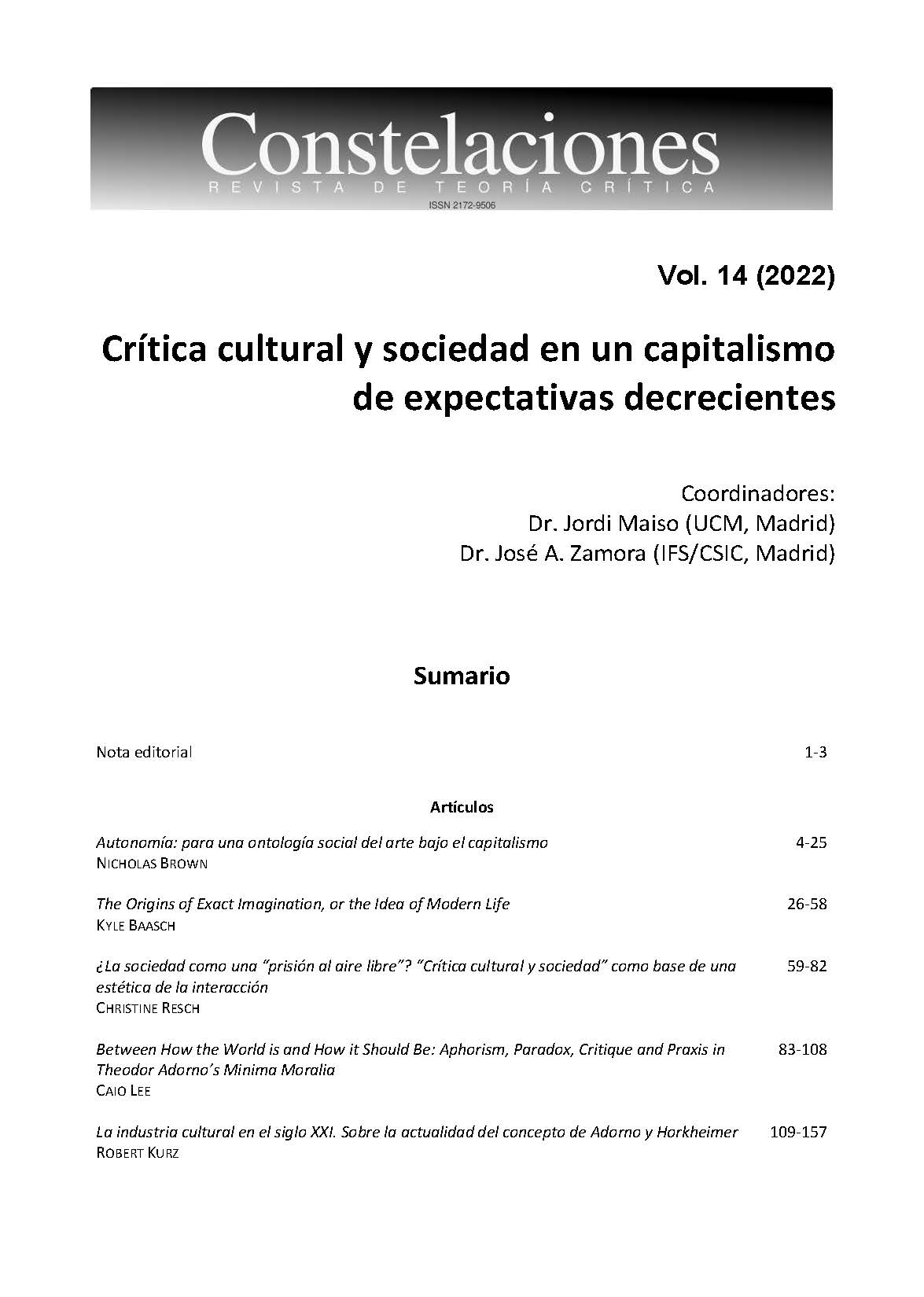El rugido desde la realidad: algunas coordenadas sobre el pop en Diedrich Diederichsen
Keywords:
Diedrich Diederichsen, pop, esfera pública, industria cultural, vidaAbstract
This article sets out to trace some of the elements that articulate the notion of pop in the German cultural critic Diedrich Diederichsen. To do so, it will initially present the triple division he proposes in his understanding of the culture industry -which explicitly complicates Adorno and Horkheimer's proposal- and allows pop (with special emphasis on pop music) to be situated as part of the second stage of the division. From this contextualisation, some of the distinctions, problems and tensions that Diederichsen finds in pop music will be established, with special emphasis on its "indicative character" [Indexical]. The second part of the text deals specifically with the problem of life in pop: on the one hand, from the binomial between Loop and Weiter and, on the other, from the notion of the subject that emerges from it from three axes: participation, pose and vitality.
Downloads
References
ADORNO, Theodor W. (1986): Minima Moralia. Reflexionen aus dem beschädigten Leben, Berlín: Suhrkamp.
ADORNO, Theodor W. (2001): Minima Moralia.Resflexiones desde la vida dañada, trad. Joaquín Chamooro Mielke, Madrid: Taurus.
ADORNO, Theodor W. (2005). Mínima Moralia. Reflections on a Damaged Life, trad. E. F. N. Jephcott, Londres/Nueva York: Verso.
ADORNO, Theodor W. y HORKHEIMER, Max (2007): Dialéctica de la ilustración, trad. Joaquín Chamorro Mielke, Madrid: Akal.
ADORNO, Theodor W. y HORKHEIMER, Max (1986): Dialektik der Aufklärung, Berlín: Suhrkamp.
CUTTLER, Chris (2000): “Plunderphonics”, en Simon Emmerson (2000) Music, electronic media, and culture, Londres/Nueva York: Routledge, 87-113.
DEISL, Heinrich y DIEDERICHSEN, Diedrich (2017): “Saying ‘Yes!’ While Meaning ‘No!’ –A conversation with Diederich Diederichsen”, en Uwe Schülte (2017): German Pop Music: A Companion, Berlín/Boston: De Gruyter.
DIEDERICHSEN, Diedrich (1985): Sexbeat. 1972 bis heute. Colonia: Kiepenheuer und Witsch.
DIEDERICHSEN, Diedrich (1993): Freiheit macht arm. Das Leben nach Rock’n’Roll. 1990-93, Colonia: Kiepenheuer und Witsch.
DIEDERICHSEN, Diedrich (1996): Politische Korrekturen, Colonia: Kiepenheuer und Witsch.
DIEDERICHSEN, Diedrich (1999): Der lange Weh nach Mitte, Colonia: Kiepenheuer und Witsch.
DIEDERICHSEN, Diedrich (2005a): Personas en loop: ensayos sobre cultura pop, trad. Cecilia Pavón, Buenos Aires: Interzona.
DIEDERICHSEN, Diedrich (2005b): Musikzimmer. Avantgarde und Alltag, Colonia: Kiepenheuer und Witsch.
DIEDERICHSEN, Diedrich (2008a): Kritik des Auges, Hamburg, Fundus.
DIEDERICHSEN, Diedrich (2008b): Eigenblutdoping. Selbsverwertung, Künstlerromantik, Partizipation, Colonia: Kiepenheuer und Witsch.
DIEDERICHSEN, Diedrich (2012): The Sopranos, Berlín, Diaphanes.
DIEDERICHSEN, Diedrich (2013): Pop–deskriptiv, normativ, emphatisch“, en VV. AA. (2013): Texte zur Theorie des Pop, Stuttgart: Reclam, pp. 185-198.
DIEDERICHSEN, Diedrich (2014), Über Pop-Musik, Colonia: Kiepenheuer und Witsch.
DIEDERICHSEN, Diedrich (2015): Körpertreffer. Zur ästhetik der nachpopulären Künste, Berlín, Suhrkamp.
DIEDERICHSEN, Diedrich y MANEROS ZABALA, Erlea (2014): Carta(s). El pop vs. Lo popular, trad. Juan de Sola, Madrid: MNCARS.
DIEDERICH, Diedrich; PENTH, Boris; WÖRNER, Natalia y DORMAGEN, Christel (1993): Das Madonna Phänomen, Hamburgo: Klein Verlag.
GUNKEL, David J (2015): Of remixology. Ethics and Aesthetics After Remix, Massachussets: MIT Press.
HEBDIGE, Dick (2004): Subcultura. El significado del estilo, trad. Carlos Roche, Barcelona: Paidós.
LASH, Scott y LURY, Celia (2007): Global Culture Industry: The Mediation of Things, Cambridge: Polity.
MARCUS, Greil (1993). Rastros de carmín. Una historia secreta del siglo XX, trad. Damián Alou, Barcelona: Anagrama.
OSWALD, John (1985): "Plunderphonics, or Audio Piracy as a Compositional Prerogative", en http://www.plunderphonics.com/xhtml/xplunder.html [Consultado el 22 de abril de 2022].
REYNOLDS, Simon (2012): Retromania: Pop Culture's Addiction to Its Own Past. Londres: Faber & Faber.
SONTAG, Susan (1996): “Notas sobre lo camp”, en Contra la interpretación, trad. Horacio Vázquez Rial, Madrid: Alfaguara, 355-376.
STERNE, Johnatan (2003): Audible Past. Cultural origins od sound reproduction. Duke: Duke University Press.
Downloads
Published
How to Cite
Issue
Section
License
Copyright (c) 2022 Marina Hervás

This work is licensed under a Creative Commons Attribution-NonCommercial-ShareAlike 4.0 International License.
Authors who have publications with this journal accept the following terms:
1. Authors will retain their copyright and grant the journal the right of first publication of their work, which will be simultaneously subject to the License of recognition of Creative Commons CC BY-NC-SA 4.0 that allows third parties to share, redistribute and adapt the work provided it is for non-commercial purposes and its author and first publication in this journal is indicated.
2. Authors may adopt other non-exclusive distribution license agreements for the version of the published work (e.g., depositing it in an institutional electronic archive or publishing it in a monographic volume) provided that the initial publication in this journal is indicated.
3. Authors are permitted and encouraged to disseminate their work via the Internet (e.g., in institutional telematic archives or on their website) before and during the submission process, which can produce interesting exchanges and increase citations of the published work. (See The Effect of Open Access).
Data confidentiality
1. Constelaciones. Revista de Teoría Crítica guarantees that the data you send us will only be used to meet the requests made in this message.
2. Your data will not be passed on to third parties.
3. You may request that your data be removed from our records at any time.





